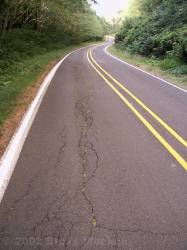Rural Roads
Rural roads consist of local roads whose primary function is to provide access to adjacent properties and arterial routes. As described here, rural roads are low car and light truck traffic with some bus, heavy truck and local farm traffic. Speeds vary but in many locations they can approach highway speeds.

Figure 1: Rural Road in Grandview
Assumed Traffic
Low to high speed, low traffic volume and some heavy loadings. Heavy truck traffic is usually limited to those involved with local services and delivery or farm machinery.
| Vehicle Type | Vehicles per day |
Vehicles per year |
ESALs per year |
|---|---|---|---|
| Cars and Light Trucks | 1,500 | 500,000 | 300 |
| Medium Trucks and Buses | 20 | 7,000 | 1,800 |
| Heavy Trucks and Buses | occasional | 50 | 50 |
| Totals | 1,520 | 507,050 | 2,150 |
Design Considerations
Rural road loading can vary widely. Roads that are part of bus routes or are commonly used by heavy trucks (such as roads next to a gravel quarry) should be designed using an approved procedure.
Construction Considerations
Rural roads are often been built on minimally prepared subgrade, which can lead to subgrade failure resulting in fatigue cracking and depressions (see Figures 1 and 2). Special attention should be paid to questionable subgrade areas and nearby fill embankments than may erode causing an edge depression or failure. A construction geotextile can be used to help stabilize roadways with early signs of subgrade failure or extensive cracking. However, extensive subgrade distress cannot be solved by geotextile application.

Figure 2: Roads Showing Deterioration Because of a Lack of Subgrade Support on the Edges

Figure 2: Roads Showing Deterioration Because of a Lack of Subgrade Support on the Edges
Recommended References
- American Association of State Highway and Transportation Officials (AASHTO). (1993). AASHTO Guide for Design of Pavement Structures. American Association of State Highway and Transportation Officials. Washington, D.C. (AASHTO)
- The Asphalt Institute. (1999). Thickness Design – Asphalt, Manual Series No. 1. The Asphalt Institute. Lexington, KY. (Asphalt Institute)
- National Asphalt Pavement Association (NAPA). (2001). HMA Pavement Mix Type Selection Guide, Information Series 128. National Asphalt Pavement Association. Landham, MD. (NAPA)
Design Catalog



